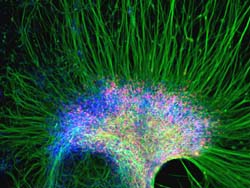 David Brooks in New York Times proclaims the outsourcing of his mind into GPS devices, Wikipedia and cell phones. Technology is changing the way we think and remember things. It is making us both mentally lazier and, as I’ve suggested before, more accurate.
David Brooks in New York Times proclaims the outsourcing of his mind into GPS devices, Wikipedia and cell phones. Technology is changing the way we think and remember things. It is making us both mentally lazier and, as I’ve suggested before, more accurate.I lamented this recently when my Casio atomic solar watch died due to the gumming up of the backlight button from too much swimming, riding and sweating over the giant, clunky, but remarkably functional watch. I had to start remembering the date and the day of the week. I had to stop using my preset alarms to remind me of the differences between Monday early-release days and other days for my son’s school. I had to expect to be inaccurate with my analog backup watch.
And then there was another day in September when I was out-of-town and having lunch with friends. The topic of tapioca pudding came up and none of us could recall what the origin of tapioca was. Out came the IPhone and we quickly resolved the question, fixing my partially inaccurate recollection from my Peace Corps time in Fiji that tapioca was related to dalo (taro). In fact, tapioca is from another root crop called cassava.
So these technologies may sometimes be reducing our cognitive commitments to certain information (the day and date), but they are also allowing us to reduce ambiguity in answering questions of a factual nature, and in a manner that exceeds what our natural mental capacities allow.
But what is missing for me is information convergence, where the knowledge contained in your DVR or GPS path memory is instantly accessible, exportable, importable, and available for all your needs. My car links via Bluetooth to my phone, but has separate voice memory for dialing. I can download new tunes through ITunes but my car can’t automatically grab Car Talk off NPR through the satellite radio and store it for later listening. Nor can I export my DVR content easily to my laptop for watching while at the park.
But the right technologies are available for the next step forward. The Semantic Web provides a beginning to achieve this step by providing a standard for self-describing information. Extensible Markup Language (XML) is the basis for Semantic Web. XML is an information representation language that is similar to HTML but is not merely designed for web page representation. The problem is that a representation language is useless unless every technology agrees on how to represent different information resources. Semantic Web standards provide a meta-description for XML data that makes it possible to code information in meaningful ways, where “meaningful” is defined by the capacity to share information between systems, converting information into knowledge in some sense.
Someday soon, my Ofamind.com approximation of Vannevar Bush’s Memory Extender may be able to talk to my DVR and help me find quotes from PBS’s The War, and my GPS will help me retrace the path of the California gold rush, as exported by Wikipedia. Someday soon.













